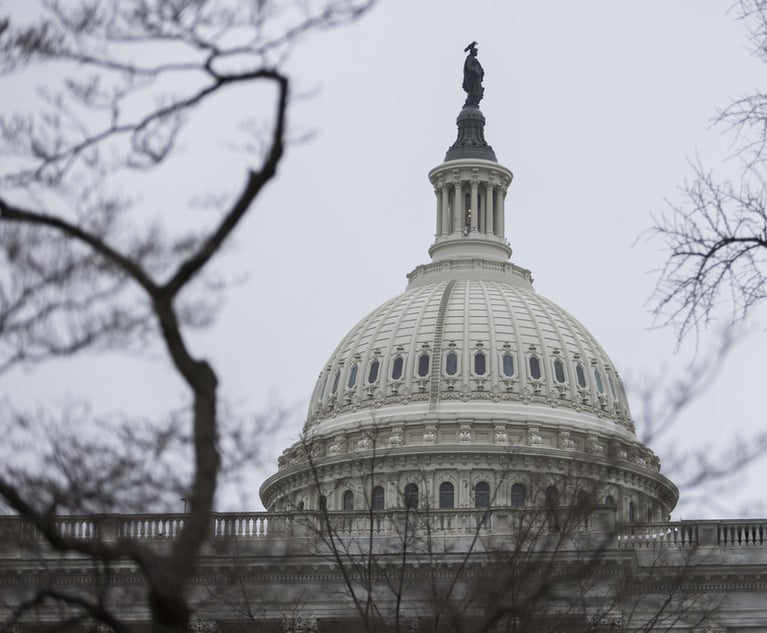 Sacramento State Capitol building on Capitol Way. Credit: Jason Doiy/ Recorder
Sacramento State Capitol building on Capitol Way. Credit: Jason Doiy/ Recorder6 Trial Judges Lose Push for Greater Pension Benefits
The appellants are trial court judges who were elected in the summer of 2012 but whose new terms did not start until Jan. 7, 2013, six days after the pension changes went into effect.
March 21, 2018 at 03:17 PM
4 minute read
Six state trial judges who were elected in 2012 but didn't take the bench until 2013 are stuck with a less generous pension plan that kicked in that year, the First District Court of Appeal said Tuesday.
The unanimous three-justice panel affirmed a San Francisco Superior Court ruling that found even though the six trial court judges were initially included in the more lavish Judges' Retirement System II plan, that doesn't mean they were exempt from statutory changes enacted on Jan. 1, 2013.
 Kathleen Banke (2009). Credit: Jason Doiy/The Recorder
Kathleen Banke (2009). Credit: Jason Doiy/The Recorder“While we certainly sympathize with the appellates' frustration over the erroneous information with which they were provided, [the state] cannot be estopped from correcting a legal mistake and ensuring that JRS II is managed in conformance with the operative statutes,” Justice Kathleen Banke wrote for the court.
Faced with skyrocketing public pension costs, the Legislature and Gov. Jerry Brown approved changes in 2012 that would require future employees to contribute more to their retirement plans. The legislation covered judges, too.
New judges would contribute 15.25 percent of their salary to their pensions compared to 8 percent for existing judges. Pension payments for future judges would also be based on their final three years' of salaries instead of their one final year. The changes meant new judges would take home 7.25 percent less in each paycheck than their more veteran peers.
The appellants are six trial court judges who were elected in the summer of 2012 but whose new terms did not start until Jan. 7, 2013, six days after the pension changes went into effect. The judges say they were assured by state officials they would be covered by JRS II based on their election date. And they did initially receive those benefits, until March 2014 when the state did “an about-face,” according to the appellate panel, and decided they had to pay the higher 2013 pension contributions.
In addition to arguing that the state should live up to its initial assertions, the judges said their election gave them a “vested right” to the better benefits of 2012. The panel disagreed.
“No case cited by appellants, nor any of which we are aware, suggests, let alone holds, that merely being elected to fill an office gives rise to a vested right in any of the benefits associated with that office as of the date the individual is elected,” Banke wrote. “Rather, vested rights arise when an individual actually assumes office and commences his or her public employment.”
The appellants also argued that the effective reduction in their take-home pay violates state law ensuring that judges' pay won't be reduced during their time in office. The appellate justices said they could find no state case law on point but were persuaded by U.S. Supreme Court and New York state cases that found that a reduction in take-home pay does not automatically trigger “non-diminution” clauses.
Moreover, the panel wrote, “state judges are bearing the same financial obligation imposed on virtually every other state employee eligible to participate in a state retirement system.”
The appellant judges are Matthew McGlynn of Tehama County; L. Brooks Anderholt of Imperial County; Tara Flanagan of Alameda County; Gary Kreep of San Diego County; Benjamin Wirtschafter of Yuba County; and Jennifer Giuliani of Kings County. They are represented by Costantin Kerestenzis of Beeson, Tayer & Bodine. Kerestenzis did not return a message seeking comment.
Deputy Attorney General Peter Chang represented the state and Timothy Yeung of Sloan Sakai Yeung & Wong served as counsel for the respondent Judicial Council. Arthur Wei-Wei Liou of Leonard Carder filed an amicus brief for the California Judges Association on behalf of the appellants.
Read more:
This content has been archived. It is available through our partners, LexisNexis® and Bloomberg Law.
To view this content, please continue to their sites.
Not a Lexis Subscriber?
Subscribe Now
Not a Bloomberg Law Subscriber?
Subscribe Now
NOT FOR REPRINT
© 2025 ALM Global, LLC, All Rights Reserved. Request academic re-use from www.copyright.com. All other uses, submit a request to [email protected]. For more information visit Asset & Logo Licensing.
You Might Like
View All
US Courts Announce Closures in Observance of Jimmy Carter National Mourning Day
2 minute read
'Serious Disruptions'?: Federal Courts Brace for Government Shutdown Threat
3 minute read
House Passes Bill to Add Federal Judgeships in Face of Biden Veto Threat

‘Really Deflating’: Judges React to Biden Threat to Veto New Judgeships Bill
Trending Stories
- 1The Importance of Contractual Language in Analyzing Post-Closing Earnout Disputes
- 2People in the News—Jan. 8, 2025—Stevens & Lee, Ogletree Deakins
- 3How I Made Partner: 'Avoid Getting Stuck in a Moment,' Says Federico Cuadra Del Carmen of Baker McKenzie
- 4Legal Departments Dinged for Acquiescing to Rate Hikes That 'Defy Gravity'
- 5Spalding Jurors Return $12M Verdict Against State Farm Insurance Client
Who Got The Work
Michael G. Bongiorno, Andrew Scott Dulberg and Elizabeth E. Driscoll from Wilmer Cutler Pickering Hale and Dorr have stepped in to represent Symbotic Inc., an A.I.-enabled technology platform that focuses on increasing supply chain efficiency, and other defendants in a pending shareholder derivative lawsuit. The case, filed Oct. 2 in Massachusetts District Court by the Brown Law Firm on behalf of Stephen Austen, accuses certain officers and directors of misleading investors in regard to Symbotic's potential for margin growth by failing to disclose that the company was not equipped to timely deploy its systems or manage expenses through project delays. The case, assigned to U.S. District Judge Nathaniel M. Gorton, is 1:24-cv-12522, Austen v. Cohen et al.
Who Got The Work
Edmund Polubinski and Marie Killmond of Davis Polk & Wardwell have entered appearances for data platform software development company MongoDB and other defendants in a pending shareholder derivative lawsuit. The action, filed Oct. 7 in New York Southern District Court by the Brown Law Firm, accuses the company's directors and/or officers of falsely expressing confidence in the company’s restructuring of its sales incentive plan and downplaying the severity of decreases in its upfront commitments. The case is 1:24-cv-07594, Roy v. Ittycheria et al.
Who Got The Work
Amy O. Bruchs and Kurt F. Ellison of Michael Best & Friedrich have entered appearances for Epic Systems Corp. in a pending employment discrimination lawsuit. The suit was filed Sept. 7 in Wisconsin Western District Court by Levine Eisberner LLC and Siri & Glimstad on behalf of a project manager who claims that he was wrongfully terminated after applying for a religious exemption to the defendant's COVID-19 vaccine mandate. The case, assigned to U.S. Magistrate Judge Anita Marie Boor, is 3:24-cv-00630, Secker, Nathan v. Epic Systems Corporation.
Who Got The Work
David X. Sullivan, Thomas J. Finn and Gregory A. Hall from McCarter & English have entered appearances for Sunrun Installation Services in a pending civil rights lawsuit. The complaint was filed Sept. 4 in Connecticut District Court by attorney Robert M. Berke on behalf of former employee George Edward Steins, who was arrested and charged with employing an unregistered home improvement salesperson. The complaint alleges that had Sunrun informed the Connecticut Department of Consumer Protection that the plaintiff's employment had ended in 2017 and that he no longer held Sunrun's home improvement contractor license, he would not have been hit with charges, which were dismissed in May 2024. The case, assigned to U.S. District Judge Jeffrey A. Meyer, is 3:24-cv-01423, Steins v. Sunrun, Inc. et al.
Who Got The Work
Greenberg Traurig shareholder Joshua L. Raskin has entered an appearance for boohoo.com UK Ltd. in a pending patent infringement lawsuit. The suit, filed Sept. 3 in Texas Eastern District Court by Rozier Hardt McDonough on behalf of Alto Dynamics, asserts five patents related to an online shopping platform. The case, assigned to U.S. District Judge Rodney Gilstrap, is 2:24-cv-00719, Alto Dynamics, LLC v. boohoo.com UK Limited.
Featured Firms
Law Offices of Gary Martin Hays & Associates, P.C.
(470) 294-1674
Law Offices of Mark E. Salomone
(857) 444-6468
Smith & Hassler
(713) 739-1250






